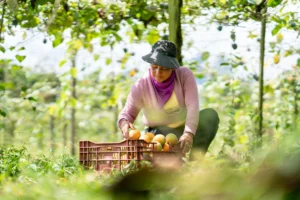Originally published January 28, 2020 by Harvard Law Today.
A national leader in food law and policy, Broad Leib founded the first food law and policy clinic in the country
 Emily Broad Leib ’08, founder and director of the Harvard Law School Food Law and Policy Clinic, has been named clinical professor of law at Harvard Law School. She was formerly an assistant clinical professor at HLS.
Emily Broad Leib ’08, founder and director of the Harvard Law School Food Law and Policy Clinic, has been named clinical professor of law at Harvard Law School. She was formerly an assistant clinical professor at HLS.
A national leader in food law and policy, Broad Leib founded the first food law and policy clinic in the country at Harvard Law School. She has used her position to advocate for improvements to the laws and policies that govern America’s food system, including in the area of food waste. She also serves as deputy director of the Harvard Law School Center for Health Law and Policy Innovation.
“Emily Broad Leib is a superb teacher and is internationally respected for her groundbreaking work on food law and policy,” said John F. Manning ’85, the Morgan and Helen Chu Dean of Harvard Law School. “Through her commitment, intellectual leadership, and teaching, she has inspired countless students and attorneys to pursue options within the legal system to improve the food system and enhance the well-being of others.”
“I am humbled by my promotion to clinical professor, and full of gratitude at the opportunity to continue working alongside the committed and inspiring faculty, staff, and students of the HLS community. It has been a pleasure to make my home at such a supportive institution that has provided the resources and vision for me to build the first clinic in food law and policy, to develop opportunities for students to learn and participate in the vital field of food law, and to see the impact the Food Law and Policy Clinic has had and will continue to have on policies that impact the environment, health, and social justice,” Broad Leib said.
Broad Leib joined HLS’s Center for Health Law and Policy Innovation in 2010 as a senior clinical fellow. The following year, in 2011, she founded the Harvard Law School Food Law and Policy Clinic (FLPC), which provides legal advice to nonprofits and government agencies, while educating law students about ways to use law and policy to impact the food system.
Broad Leib focuses her scholarship, teaching, and practice on finding solutions to some of today’s biggest food law issues, aiming to increase access to healthy foods, eliminate food waste, and support sustainable food production. She has published scholarly articles in the California Law Review, Wisconsin Law Review, the Harvard Law & Policy Review, and the Food & Drug Law Journal, among others.
In 2015, she was an inaugural recipient of Harvard University’s Climate Change Solutions Fund. Her project “Reducing Food Waste as a Key to Addressing Climate Change,” was one of seven chosen from around the university to confront the challenge of climate change by leveraging the clinic’s food law and policy expertise to identify systemic solutions to reduce food waste, which is a major driver of climate change.
Under Broad Leib’s direction, FLPC has been advocating for the standardization of date labels since the release of its 2013 report “The Dating Game: How Confusing Food Date Labels Lead to Food Waste in America.” FLPC has also worked with members of Congress on legislation to reform the expiration date system, and Broad Leib testified for Congress on date labels and other areas of federal policy that impact the amount of food that goes to waste. She led work with the two largest food trade associations to implement a voluntary standard for date labels, which will go into effect this year. Last summer, the clinic released a follow up issue brief “Date Labels: The Case for Federal Action.”
Beyond date labels, Broad Leib has led the clinic in supporting food producers, businesses, and government agencies in understanding and improving laws relevant to food waste and food recovery. The clinic’s work has included consulting to government agencies and legislators at the federal level and in nearly two dozen states, and publication of scores of policy reports and toolkits, including Opportunities to Reduce Food Waste in the 2018 Farm Bill (2017) and Food Safety Regulations and Guidance for Food Donations: a 50-State Survey of State Practices (2018) and a number of resources to support states and localities in addressing food waste through policy, including “Bans and Beyond: Designing and Implementing Organic Waste Bans and Mandatory Organics Recycling Laws” (2019) and “Keeping Food Out of the Landfill” (2016).
Drawing on this expertise, in 2019, Broad Leib launched the Global Food Donation Policy Atlas project, through which she and clinic staff and students are partnering with local food donation agencies in fifteen countries around the globe to compare and analyze the laws relevant to food donation, and make recommendations for best practices that can help more safe, wholesome food make it to those in need.
In 2016, she was named by Fortune and Food & Wine to their list of 2016’s Most Innovative Women in Food and Drink. Her groundbreaking work has been covered in such media outlets as The New York Times, the Los Angeles Times, the Boston Globe, The Guardian, TIME, Politico, and the Washington Post. She has appeared on CBS This Morning, CNN, The Today Show, and MSNBC.
In 2016, Broad Leib partnered with colleagues around the country to found the Academy of Food Law and Policy, the first-ever academic association for the growing number of faculty and scholars teaching and writing in the field of food law and policy. She served as the founding co-chair of the Academy’s Board of Trustees from 2016 to 2019.
After graduating from HLS, Broad Leib spent two years in Clarksdale, Mississippi, as the Joint Harvard Law School/Mississippi State University Delta Fellow. She directed the Delta Directions Consortium, a group of university and foundation leaders who collaborate to improve public health and foster economic development in the Delta region. In that role, she worked with community members and outside partners, and with support from more than 60 HLS students, to design and implement programmatic and policy interventions on a range of critical health and economic issues in the region.
Broad Leib’s fellowship work in Mississippi inspired the Mississippi Delta Project, a student practice organization at HLS that provides opportunities for current students to continue advocating for similar issues in the Mississippi Delta region. Broad Leib continues to support that organization as the faculty supervisor. She is also the faculty supervisor for the Harvard Law School Food Law Society.
In 2013, she was appointed deputy director of the Center for Health Law and Policy Innovation. In 2015, she was named an assistant clinical professor of law.
Broad Leib received her J.D. from Harvard Law School and her B.A. from Columbia University.


Food Law & Policy, Commentary
Policy to Reduce Methane Emissions and Feed More People
April 3, 2025